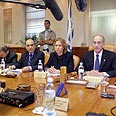
Olmert: Lebanese government will be responsible party
Olmert discusses ceasefire deal with cabinet: Hizbullah will not continue to be a state-within-a-state. Lebanese government will become Israel's point of contact
Defense Minister Amir Peretz asked, during the meeting, to emphasize that "the prime minister's management of the war was excellent and sufficiently aggressive. His collaboration with me was precise."
Foreign Minister Tzipi Livni joined Olmert and the majority of government ministers in expressing support for the Security Council's resolution. Livni, referring to the 'morning after', said that "the question that we must ask ourselves today is where we were prior to the outbreak of conflict, when UNSCR 1559 had not been implemented, when Lebanese armed forces were not deployed in the south and when there was not an embargo on Hizbullah. No army can implement Security Council resolution demands by military means."
According to Livni, empowerment of Siniora serves Israeli interests. "Empowering Siniora does not conflict with Israeli interests, but rather the contrary."
The state of IDF soldiers
The prime minister, in his opening remarks, expressed his condolences over fallen IDF soldiers and his hopes for a speedy recovery of the wounded. "The hearts of all of us are with our soldiers," he said on the hardest day yet for the soldiers, in which 24 of them were killed.
He added that, along with Amir Peretz, he visited the families of the kidnapped soldiers to update them about efforts involved in securing their release. "An hour ago, the defense minister and I met with the Goldwasser and Regev families, whose sons, Udi and Eldad, are held captive by Hizbullah." He announced to ministers that a senior official would be placed in charge of ongoing efforts to retrieve the kidnapped soldiers.
Olmert addressed the issue of the kidnapped soldiers during his briefing to the cabinet, pursuant to criticism of the resolution, which only refers to a return of the kidnapped soldiers in its preamble and not among the document's actual clauses. Likewise, there is no mention of the kidnapped soldier in the south, Gilad Shalit.
Not an end of self-defense
The prime minister's office emphasized that the ceasefire deal does not prevent Israel from defending either its citizens or the soldiers who will remain in Lebanon until the arrival of a multinational force. For the next week or two, IDF troops will be stationed in various posts in southern Lebanon, where they will operate to prevent rocket launchings and will defend themselves.
"In the event that there is information of a Hizbullah threat on Israeli civilians or soldiers, we have the right to execute a preemptive strike," one official said. Once the decision is made to pull out forces, their withdrawal will be quick so as to prevent Hizbullah attacks on the retreating soldiers.
The cabinet also discussed a 6 percent budget cut from various government ministries, in order to finance the war. This includes the possibility of transferring 3 percent of the reserve budget of every ministry to cover the cost. The budgets that will not be affected by such a cut: the welfare budget, the budget for 'medical packages' and the police budget for the prevention of hostile activities.










